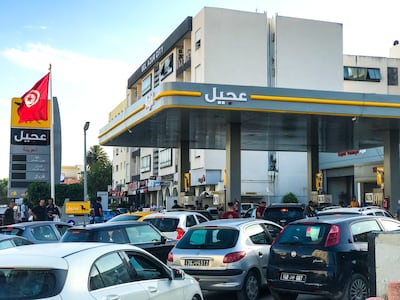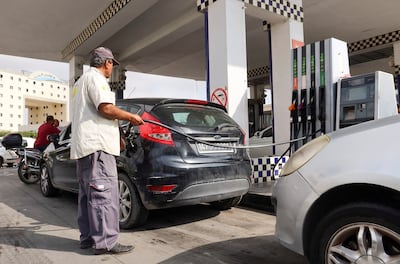Dozens of cars blocked streets in Tunis on Wednesday as fuel shortages caused long queues at petrol stations across Tunisia.
Motorists expressed their frustration at the petrol crisis, compounding food and other shortages the country is experiencing in an economic decline.
Taha Yassine, a tour guide, says he stopped working for three days as he could not find enough fuel for his car.
“I’ve been waiting since 11am and I still can’t get my car to move through the line,” Mr Yassine told The National at a petrol station in Tunis' L’Aouina suburb, after a five-hour wait.
Amina was holding an empty tin and begging the supervisors at the petrol station to give her a litre of petrol so she could take her car to fill up.
“My car is stuck at the roundabout and I can’t even get it to the gas station,” Amina said.
“I can’t pick up my kids from their nursery as I’m stuck here. They refuse to even fill this tin to move my car."
Neila Nouira Gongi, the Tunisian Minister of Industry, told official state news agency TAP on Monday that she expected the crisis to be resolved this week as a fuel shipment had arrived at Bizerte port and was awaiting transport to warehouses in the capital.
It has been claimed that Tunisian users' behaviour is to blame for the long queues.
“People need to have some understanding in the midst of this crisis,” said Fathi, a supervisor at the Agil National Oil Distribution Company station in L’Aouina.
"But the problem is that some Tunisians refuse to get a small amount of gasoline to leave some for the rest.
Ms Gongi also attributed some of the fault to consumers, but observers say government ineptitude and its inability to pay its debt to suppliers is the cause of the crisis.

“What is happening is something predictable,” Slim, a Tunisian who has been living in Doha, Qatar, for 10 years and recently returned to Tunisia, told The National as he queued for petrol.
"If we have reached this point, it only means that you as a state have failed.
“Cars now are a tool of production, they are no longer a luxury.
“Unfortunately, we are not in the Netherlands where roads have cycle tracks that people could use or where we have a public transport system that is functional and we could rely on.
“I cannot really blame people whose cars are stuck somewhere and who are frantically trying to fill up their car tanks so that they won’t need to come back to this same masquerade."
Livelihoods at risk

Mohamed Ali, a vegetable merchant from Dar Fadhal, said he could not go to the wholesale market for stock because of the fuel shortages.
“My pickup truck is stuck at the end of this road and they refuse to even fill up this five-litre can for me to get going somewhere else to figure out an alternative,” he said.
As Mr Ali recounts his woes, plainclothes police officers arrive and try to break up the queue, after a call from the Agil station’s supervisors.
He is one of the unlucky ones who are pushed out of the queue, meaning another day without an income.
“We don’t care about you, you already knew there was a crisis in the country,” a police officer yelled at people in the queue.
“You should not have brought out your car in the first place and I cannot encourage you to break the law.”.
Police and the gas station supervisors said that it was illegal to fill empty bottles or cans with petrol.
“Giving people gasoline in bottles is a dangerous outcome of this crisis, people start fighting with lit cigarettes in their hands, it could cause an explosion, God forbid,” said Fathi, who stopped giving out petrol in cans when he noticed The National's video camera.
The Ministry of Industry said that the Bizerte refinery station was supplied with 5,300 cubic metres of unleaded fuel and it was taken to warehouses for distribution to retailers.


